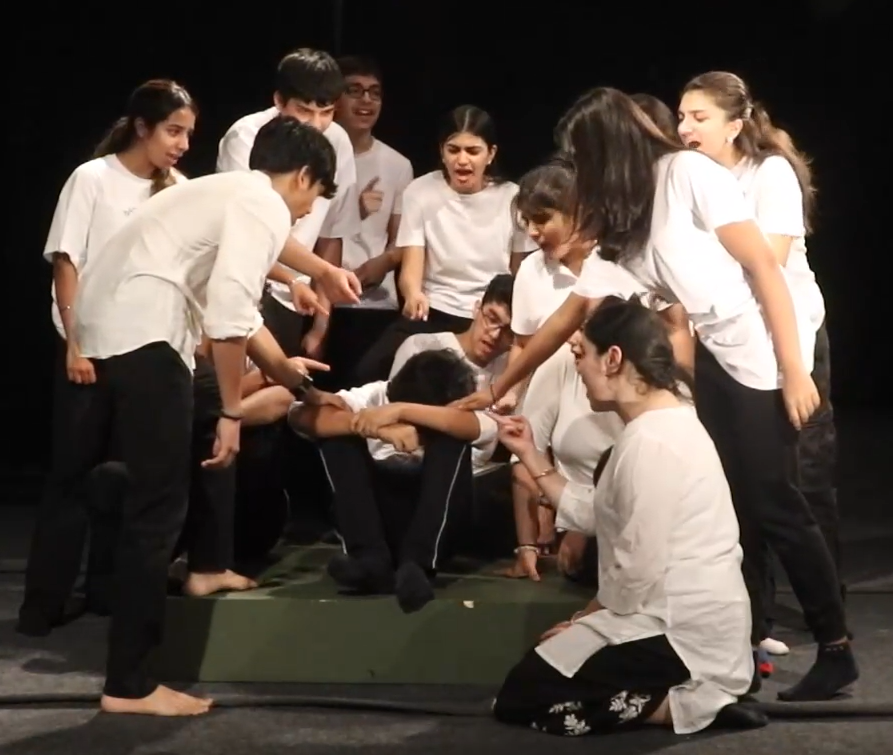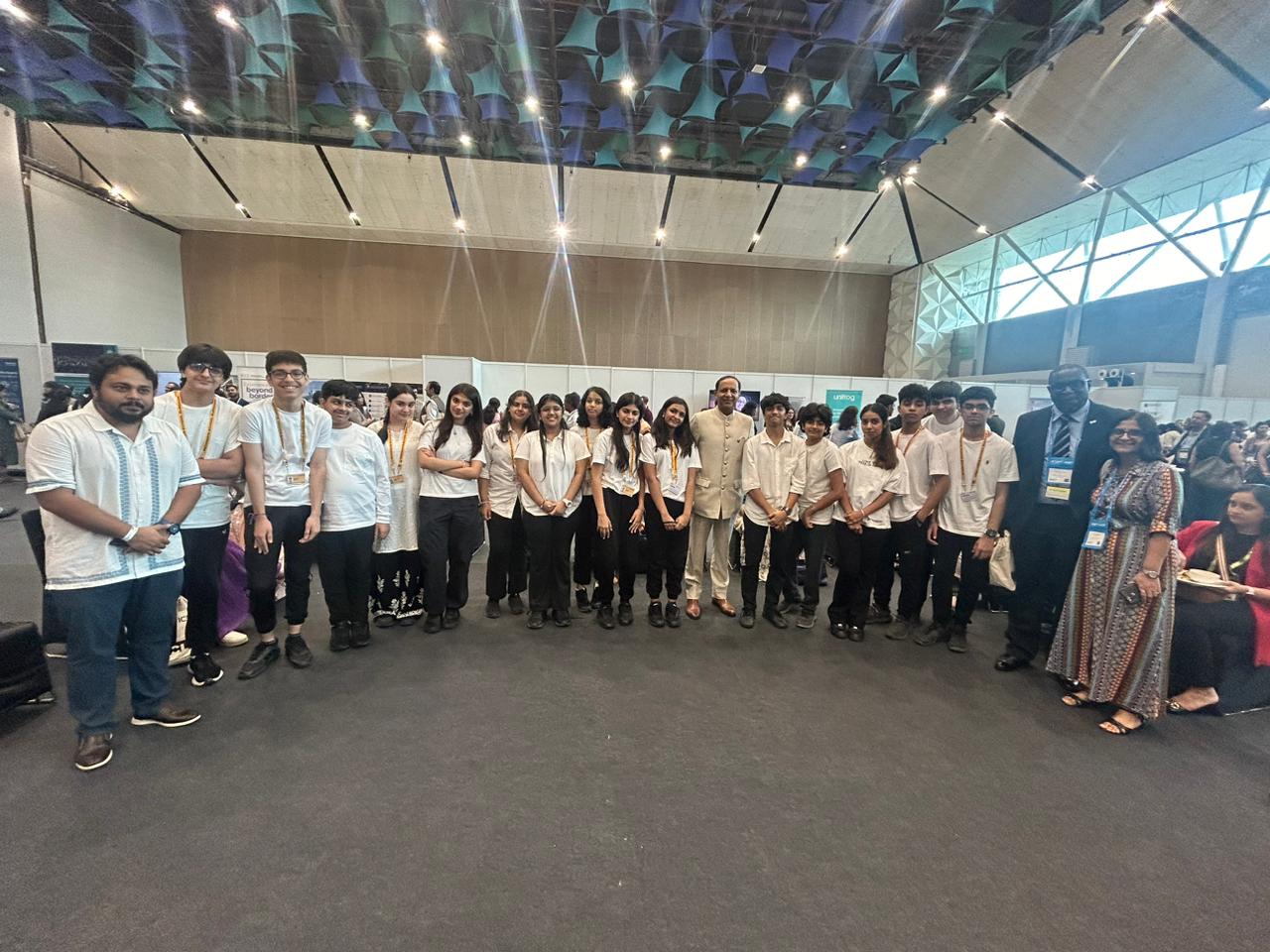
Nilay Jain
PYP 5

Nilay Jain
PYP 5

Saanvi Sehgal
PYP 5

Arush Nath
MYP 4

Arjun Sabherwal
MYP 4

Diya Mehra
MYP 4

Arav Agarwal
MYP 5

Arhan Singhal
MYP 5

Aanya Tulsyan
DPCP 1

Oshwin Dang
DPCP 1

Abhyuthan Srivastava
DPCP 1

Yashraj Garg
DPCP 1

Nilay Jain
PYP 5

Saanvi Sehgal
PYP 5

Arush Nath
MYP 4

Arjun Sabherwal
MYP 4

Diya Mehra
MYP 4

Arav Agarwal
MYP 5

Arhan Singhal
MYP 5

Aanya Tulsyan
DPCP 1

Oshwin Dang
DPCP 1

Abhyuthan Srivastava
DPCP 1

Yashraj Garg
DPCP 1
The opportunity was presented to us by Ms. Anshu Dhingra Dié, our career counsellor, who had suggested that we perform at the prestigious event of Internation College & Career Counselling, better known as IC3. We were originally thinking of performing something light and entertaining, but upon further discussion, we realised that we should use this avenue to educate and inform our audience. People all over the world would be collaborating in the shared space of the conference – parents, teachers, students, counsellors, diplomats and leaders. We decided to stage a “Nukkad Natak” on the topic of Suicide Prevention.
A Nukkad Natak, also known as “Street Theatre”, is a form of theatre which is traditionally performed in an open street or space in front of passersby, with minimum props and simple costumes, but attention-catching dialogues, expressive gestures and body language, coupled with a hard-hitting plotline. They are used all over the world and have been used by artists like Safdar Hashmi in India itself to invoke change and unsettling emotions in their audience, almost as if to “wake” them up. In the modern world, we hear about suicides happening all the time, in the news headlines or in the hushed gossip around households, but it’s never dealt with sensitivity or an enriching insight. The topic of Suicide Prevention is one that is barely being discussed in schools and at home, leaving children and adults alike in the darkness, unaware about how to address this issue.
As artists, it is in our control what we choose to show to our audience, as we can influence them through our works. We wanted to use this platform to open eyes and tell a story, which mostly mirrored reality. We wanted to get inside our audiences’ heads, educating them while hopefully entertaining them. It would have been a shame if we let this chance slip through our grasp, and we made every effort to accurately represent the struggles of suicide victims, whether they are teenagers, adults or even children. In our theatre lessons, we broke into groups, engaging further in discourse about the possible triggers or causes of suicide, and how we could stage it dramatically, while still being respectful of people struggling in today’s day and age. We also closely followed the conventions of Epic Theatre, which uses short, episodic scenes that are detached from one another along with statistics added at the end to solidify the impact and weight of the topic. We included data that elucidated the reality of how suicides are being prevented, and how successful those measures are, as well as the areas of improvement that we found in the system.
In order to keep our audiences’ attention, we upped the ante in each scene, introducing more and more dramatic tension between characters, making it seem more stressful for them. Applying the baseline foundation characteristics of a Nukkad Natak, loud phrases, playing common tone at the end of each scene, and an accompanying ensemble to symbolise negative thoughts; we tried to make it seem as if pessimism was piling onto the suicide victim.
In theatre, we usually start writing with a discourse analysis, which is essentially looking at common media (both digital and print) that relates to the topic of presentation. We incorporated the struggle of students in Kota, queer teens facing rejection from their families, children carrying the burden of their parents’ disagreements and lonely family members, basing all our scenes on research we conducted. We consulted Ms. Megha Mathur, our school student counsellor, who provided an insight into how suicidal thoughts perpetuate in teens and young adults, giving us some coping techniques and strategies for us to include in our play. Members of the cast also individually reached out to their parents and family members, starting individual dialogue within households, and sharing their learnings and takeaways from how they reacted and their perspective on the sensitive topics.
A topic so close to our hearts, and so relevant amongst people of our age group deserved our effort, time and engagement. Meeting over calls after school to finalise the script, editing a document as one mind instead of scattered responses, working in unity to completely unlock our potential, and giving all of our energy to the practice sessions that we held. It wasn’t always easy and there were a few imperfections; from improvising lines and playing along after entering too early on stage, to sorting out arguments about the amount of stage-time and co-actor chemistry, we conquered it all, working as a team under the mentorship of our very own Dram Teacher, Mr. Santanu Mallick. It was a learning process for us all, and we are all eternally grateful to have had this exposure.
Not only did we thoroughly enjoy ourselves, but our audience also resonated deeply with our performance. Pouring our hearts out in front of a large cohort of people was a tad bit nerve-wracking, but we managed to perform an impactful play, which struck a chord with many of our spectators. Teachers, counsellors, students and even our very own school director, Captain Bajaj made it a point to recognise and appreciate our efforts, explaining to us how they felt watching us perform. It was a sensitive topic, indeed, and some were even brought to tears! A standing ovation, followed by an open discussion took place, as teachers shared with the actors how their respective schools honour the concept of suicide prevention, and how they tackle the weight of the situation. It was a heartwarming experience to have such a deep and genuine connection with our audience members; and for a minute, all the time and effort that we put in was worthwhile.
This was a brilliant experience for all of us, and is yet another feather in our cap. We will use our learning from this endeavour, and actively apply it in the creation of our Founder’s Day production of William Shakespeare’s Macbeth. We hope that we will be able to work as a team, sharing ideas, laughs, and of course, the big stage.
Hold your applause, until next time!
Watch the video here: ![]() THE SILENCE _A a performance by PSG.mp4
THE SILENCE _A a performance by PSG.mp4
By Aadya Amritesh, MYP 5


 Baliawas Off Gurugram Faridabad Road, Gurugram – 122003
Baliawas Off Gurugram Faridabad Road, Gurugram – 122003 [email protected]
[email protected]Drop us your details for a quick response.
Copyright 2023 © Pathways School Gurgaon. All rights reserved.
Design and Development by Sterco Digitex